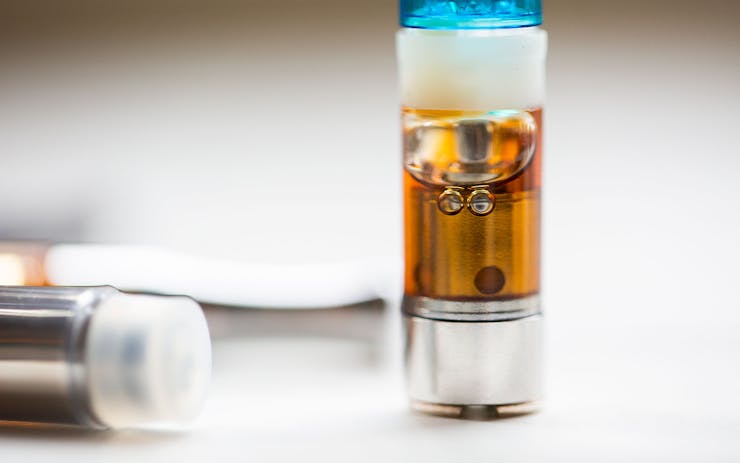PORTLAND, Ore. (AP) — Authorities in charge of Oregon’s legal marijuana market said Wednesday that they will ask store owners to voluntarily review cannabis products on their shelves and pull any they feel might be unsafe as concern mounts about severe lung illnesses and deaths tied to vaping across the U.S.
The Oregon Liquor Control Commission, which also regulates cannabis, will ask stores to put up signs warning about the potential dangers of vaping, executive director Steve Marks told The Associated Press.
“With the lack of specificity, that's about the level of action we can take at this point.”
The agency can’t ban vaping devices or any specific ingredients in them until more is known about what is causing the health problems, he said.
“The public safety agency has to tell us there’s a public health concern for us to act,” Marks said. “They have not done so yet. … With the lack of specificity, that’s about the level of action we can take at this point.”
Nationwide, hundreds of serious breathing illnesses and six deaths have been tied to contaminated THC vaporizer cartridges, including one death in Oregon.
In that case, a middle-aged man had recently vaped products containing THC that were purchased at a legal marijuana dispensary in Oregon, health authorities say.
The names of the store and company involved have not been released.
Federal and state officials are investigating what is to blame for the illnesses, and no single device, ingredient or additive has been identified as the main culprit.
Most of the patients said they vaped products containing THC. But some said they vaped only nicotine, while others said they used both THC and nicotine.
After extensive testing, New York investigators have focused on vitamin E acetate, which recently has been used as a thickener, particularly in illicit market vape cartridges.
Suppliers say it dilutes vape oils without making them look watery. Vitamin E is safe as a vitamin pill or to use on the skin but inhaling oily vitamin E droplets can trigger pneumonia.
Officials in New York have subpoenaed three of the biggest thickener manufacturers.
The Oregon Health Authority said it hasn’t conclusively linked any one product to the death in the state and couldn’t say if vitamin E acetate was involved.
Marks, the Oregon regulatory chief, said no companies selling marijuana vape cartridges at state-licensed stores have listed vitamin E acetate as an ingredient, which they would be required to do. Regulators haven’t banned or approved its use because no companies have indicated they are using it, he said.
But Oregon doesn’t test for additives like vitamin E acetate in vaping products sold at retail stores, so the regulators can’t know if it’s being added illicitly by some manufacturers, Marks said.
Any company that has added an “undisclosed agent” to its vape cartridges should tell regulators immediately or face “legal complications and probably additional liabilities,” he said.
“My worry is that some of these folks may have gone around and put vitamin E in their products that we are unaware of,” Marks said. “If it’s in our products, it’s out there and we don’t have a clear way to know which ones it may or may not be in.”
The Oregon Liquor Control Commission first heard of vitamin E acetate in May during a meeting with a company that wanted to sell its newly developed thickener containing the additive to state-licensed companies that make marijuana-infused vaping devices.
The commission said the discussion ended when it told the company it would have to list all the ingredients in the thickener instead of just calling it a “vitamin stabilizer.”
Companies and dispensary networks outside Oregon also took note of vaping additives Wednesday as a new case of lung disease emerged in Washington state.
The Berkeley Patients Group, the oldest medical dispensary in the country, said it is contacting all its vendors to ensure products are additive free.
And several prominent cannabis oil extractors distanced themselves from vaping additives, including AbsoluteXtracts and Dosist.
Clarification: An earlier version of this story appeared with a photo of vape pens made by a manufacturer that has not been implicated in the current crisis. We’ve changed the photo after recognizing that it could have mistakenly suggested those products were contaminated.





